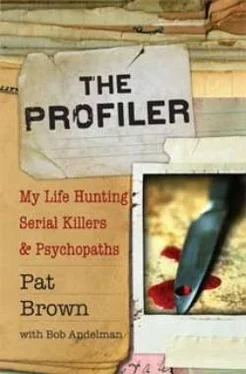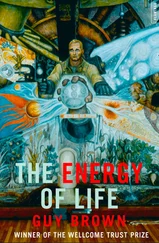A lot of sexual predators call themselves “teachers.” A person of interest in the sexual homicides of three girls in Virginia considered himself a professor of sex. I communicated with him on the Internet, posing as a fourteen-year-old girl named Veronica. He wanted me to do things to myself with various objects and hurt myself. That was what sexually excited him, and he called it teaching. He said, “I’m going to teach you the art of sex. Better me than some young boy who doesn’t know what he’s doing. I’ll teach you what pleases a man. I’ll teach you what feels good.”
In their own sick, twisted minds they become professors. And of course they want to start with a girl who’s a virgin, because they want her taught right. They will pick on a girl who’s nine to thirteen years old, just becoming a woman, and they love the idea that they will be her first. That’s part of the power trip-that nobody’s had that girl before. Once they start introducing her to these things, of course, she’s embarrassed, she’s humiliated, and sometimes, unfortunately, sexually stimulated. She becomes confused, and she doesn’t know how to tell anybody. And then, of course, there is the possibility that he threatens her. You tell anybody, I’ll hurt you, so she doesn’t.
Police told me that they believed Orville was sexually abusing Missy before her murder and that she was going to tell on him. It is possible that she could have fought back. He could have gone further than she was willing to accept, as she was already sick of being abused, and this particular time she was sleepy and not feeling well.
My hypothesis is that her father carried Missy, as she was tired, ill, and very lightweight. She was in her stocking feet-her shoes, tied together by their laces, grabbed up by Orville and carried along with his daughter. It was in the middle of the route through the woods that I believe Mr. Jones, under the influence of alcohol, did decide to sexually assault his daughter. I believe he did not intend to kill her, but when she resisted he became angry and his attempts at control ended in her death. She fought back and it got her killed. Perhaps she screamed; I believe that the sock was pushed into her mouth to stop her from making noise, because it was just a two-minute walk between houses and while it’s a wooded area, a scream can still carry in the dead of night. Missy’s shoes were not on her feet, making her sock easy to pull off her foot. Offenders often do what is easy and pulling off a sock and stuffing it in her mouth would be a quick and easy answer to shutting Missy up.
Whether or not I believe Orville killed his daughter, I don’t think he planned to kill her. The hyoid bone in the neck was not broken. Usually, when someone is strangled, that’s broken, but Missy’s was not. The autopsy report said she was asphyxiated, but if she wasn’t choked, then someone or something suffocated her. I believe it was the sock in her mouth that cut off her air supply. When he realized what he had done, he had two choices. Leave her there in the woods and have her found the very next day or place her in the trunk of an unused vehicle in the yard and have her become a missing person. The latter choice would buy time, and in his panicked state, Orville most likely felt this was the better idea. After placing her in the trunk of the vehicle, he slipped back into the house, his family never having realized he had left.
There is a theory that Missy actually arrived home and her father assaulted and killed her in her bedroom. I find this to be an unlikely scenario for two reasons. The likelihood of Missy arriving home with no one noticing, a brutal attack going unheard, and the removal of a body without being noted or heard in a small trailer with two boys asleep in the living room, which Orville would have to enter or exit, is unlikely. Also, Orville commented to Rhonda that if she went into the woods bad things could happen to her. I believe Orville was reliving the actual experience of the rape and murder of his daughter.
Orville had been drinking earlier that night, so it was possible he wasn’t careful, as he said. I believe he was indeed describing what he did to her, because I do not believe it was an intentional homicide. I believe he was sexually assaulting her and shut her up to control her, because Orville was quite a mean fellow-as he told the media the killer might be. It was an accident but it was still murder, because he killed her during the commission of a crime. When he realized she was no longer breathing, he knew he was in big trouble. I do believe, after studying his history, that he would have liked to have kept Missy around. She probably would have been a nice, useful sex partner for him for the next six years. That plan ended when she fought back.
I HOPED POLICE could use my profile to prosecute Orville, but sadly that did not happen. A profiler can go so far in a case and suddenly get the door slammed in her face. You’re so close to making a real difference, boom, and you can’t do any more, so you have to walk away.
The family will ask, “What now?”
I often find it is difficult to get justice for the family.
Once a case goes south, what do you do about it? Go talk with a reporter from the town newspaper? You might and you could get a story or two written about it. But what do you do then? All you can do is start fighting. You go to the town council and rail at the police, the prosecutor, the town itself. Usually nothing ever really amounts to anything. The family fights on and usually fights alone, and most of the time, they don’t win.
Sometimes, the family will come back to me and say, “Have you heard anything?” but eventually they give up contacting me because they realize I can’t do anything more. My job is profiling. I did my job, and I left. I’m not part of a law enforcement organization and I am not a victim’s advocacy organization that does long-term support. My job is profiling, and that’s what I do. I prefer to have the cooperation of the police department and the prosecutor so we can do the best job together. If I don’t have that, I can do only so much.
I do my job, and whether a case gets prosecuted or not, that’s not my call.
Does a profiler solve cases? No. A profiler profiles. That’s it. The police department officially is charged with solving cases; the prosecutor chooses which cases to prosecute.
AND THERE THE case of Missy Jones sits. Nothing more has been done.
Orville was never charged with his daughter’s rape and murder. If the system puts Orville back out there, he will likely go after someone else’s twelve-year-old daughter.
CHAPTER 10.JIMMY:WITH FRIENDS LIKE THIS
The Crime: Homicide
The Victim: Jimmy Conway
Location: Home of his friend, Southwestern United States
Original Theory: Shot in self-defense
People often wonder whether profilers go to the actual crime scene or if they don’t always bother and, in truth, I always go if I can. I can learn a lot by being there, standing on the spot where the victim and perpetrator once stood, absorbing the environment.
For example, you might think that some guy could toss a fellow off a particular bridge because the pictures you are looking at make that seem plausible. This happened to me on a case in Minneapolis. One of the theories was that the victim, who had been drinking at a local bar on Halloween night and been thrown out for being too inebriated, was walking over that bridge when he ran into another young man his age who tried to rob him. When he resisted, the guy pushed him over the railing. Well, that could make sense, except when I actually stood on the Hennepin Bridge at the point where it crossed the Mississippi River, I wondered how this shorter, smaller, less muscled attacker could have accomplished this. The railing was so high that the robber would have had to pick him up off the ground and heave him over it. If I hadn’t gone to the scene, I might have erroneously believed that action was possible. When you go to the location, you can see the neighborhood. You can see possible escape routes. You can analyze why someone would go that way and not this way.
Читать дальше












